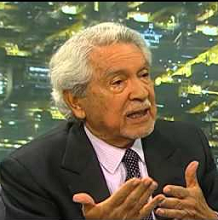 Pedro Gómez Barrera
Pedro Gómez Barrera
dejó una importante huella en Colombia
Iba a escribir sobre el “zaperoco” creado por Gustavo Petro, con sus malpensadas y poco estudiadas reformas, como la de salud y la de pensiones, y con sus obtusas amenazas, divisorias e incendiarias, gritadas desde un balcón del palacio presidencial, al estilo del trasnochado comunismo del siglo pasado. Sin embargo, no lo haré. Ya habrá tiempo de sobra para combatir este debacle que apenas comienza.
Escribiré sobre Pedro Gómez Barrera, quien nos acaba de dejar y se merece ser reconocido como un personaje colombiano de esos que han creado progreso, desarrollo, empleo y riqueza, comenzando prácticamente de ceros. Uno de esos que demuestran como, en Colombia, no es la cuna la que marca un destino, sino el valor, el propósito, la inteligencia, la constancia y la capacidad. De esos hombres de paz que Gustavo Petro pretende denigrar llamándolos “oligarcas”. 
Pedro Gómez nació en Bogotá en 1929. Sin embargo, siempre consideró su patria chica a Cucunubá, tierra de sus ancestros. Hijo de una maestra de escuela, dedicó muchos de sus esfuerzos a premiar el trabajo de los docentes colombianos.
Desde su juventud fue un hombre de propósitos fijos, metas retadoras y una arrolladora fortaleza para lograrlas. Pedro era ante todo un hombre seguro de sí mismo, esa cualidad lo llevó a realizar obras que un hombre menos resuelto, jamás habría logrado.
- Hits: 1508
 Al final de su más reciente novela, su decimoquinta («Victory City», la ciudad de la victoria), el muy perseguido y amenazado escritor británico de origen indio, Salman Rushdie, a través de un personaje afirma con convicción: «mientras los regímenes caen, las historias sobreviven. Las palabras son las vencedoras».
Al final de su más reciente novela, su decimoquinta («Victory City», la ciudad de la victoria), el muy perseguido y amenazado escritor británico de origen indio, Salman Rushdie, a través de un personaje afirma con convicción: «mientras los regímenes caen, las historias sobreviven. Las palabras son las vencedoras». They went to the extreme of conspiring against the acting President, to whom they owed allegiance according to the country's Constitution, promoting investigations without cause and leaking false information that the media spread without revealing the sources, taking refuge in an ethical "privacy rule".
They went to the extreme of conspiring against the acting President, to whom they owed allegiance according to the country's Constitution, promoting investigations without cause and leaking false information that the media spread without revealing the sources, taking refuge in an ethical "privacy rule". Estados Unidos se fundó bajo la premisa de que la libertad es un valor universal. Thomas Jefferson, en la Declaración de Independencia, fue inequívoco: “Consideramos como verdades evidentes que todos los hombres son creados iguales; que son dotados por su Creador con ciertos derechos inalienables, entre los cuales están la vida, la libertad y la búsqueda de la felicidad”. Pero, ¿es ciertamente la libertad ansiada universalmente por todos los pueblos, en todas partes, todo el tiempo?
Estados Unidos se fundó bajo la premisa de que la libertad es un valor universal. Thomas Jefferson, en la Declaración de Independencia, fue inequívoco: “Consideramos como verdades evidentes que todos los hombres son creados iguales; que son dotados por su Creador con ciertos derechos inalienables, entre los cuales están la vida, la libertad y la búsqueda de la felicidad”. Pero, ¿es ciertamente la libertad ansiada universalmente por todos los pueblos, en todas partes, todo el tiempo? En días pasados se presentó oficialmente la alianza estratégica entre los gobiernos ruso y cubano. Un think tank de la lejana nación asesorará las transformaciones económicas que Cuba hará para asumir el modelo ruso de economía de mercado con una autocracia hegemónica y excluyente. Es el cambio fraude.
En días pasados se presentó oficialmente la alianza estratégica entre los gobiernos ruso y cubano. Un think tank de la lejana nación asesorará las transformaciones económicas que Cuba hará para asumir el modelo ruso de economía de mercado con una autocracia hegemónica y excluyente. Es el cambio fraude.